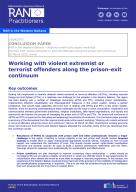Details
- Publication date
- 16 August 2022
- Author
- Directorate-General for Migration and Home Affairs
- RAN Publications Topic
- Victims of terrorism
Description
Dealing with imprisoned or recently released violent extremist or terrorist offenders (VETOs), including returned foreign terrorist fighters (FTFs), is a relatively new challenge for the societies in the Western Balkans. The region has been dealing with a number of challenges concerning VETOs and FTFs, including prison radicalisation, implementing effective rehabilitation and disengagement measures in the prison system, lacking a gender perspective, and overall weak capacities and know-how in dealing with VETOs and FTFs in the prison system.
However, there is a growing understanding of these challenges and the ways in which coordination, cooperation and communication between government authorities, religious institutions, faith-based organisations, civil society and community can improve the process of managing the prison exit of VETOs and FTFs. The prison-exit continuum of VETOs and FTFs is important for disrupting and weakening the potential of recidivism.
This conclusion paper provides a summary of the discussions from the regional small-scale online expert workshop “Working with violent extremist or terrorist offenders along the prison-exit continuum” held on 30 March 30 2022. Practitioners working along the prison-exit continuum from the EU and Western Balkans attended the workshop.
Some of the key takeaways from this workshop include:
- Reluctance of VETOs to cooperate with prison staff and other professionals remains a major challenge in the region. Investing in human capacity is key and prison staff should receive targeted training to enable them to apply individualised approaches towards VETOs, including on how to build rapport and understand the mechanics of trust. This should include human rights-based investigative interviews and dynamic security as ways to build a positive professional relationship with the client. Trainings should be assessed more systematically for sustainability and effectiveness.
- Prison conditions are also important to improve involuntary client relationships — prison should be normalising life and providing a healthy environment in which the offender starts to see opportunities for rehabilitation after release and would be more likely to engage in relevant programmes. In this context, the experience of the Western Balkan countries shows that trust of the prisoners in the credibility of reintegration and deradicalisation programmes is important. This is to say that the prisoners should have the confidence that such programmes are truly there to support them.
- Reaching out to family members of VETOs and providing them with support (educational, socioeconomic, medical, mental health) has proven to be very effective in gaining trust, prioritising concrete steps for the post-release period and preparing for transition into the community. This might look like identifying one person from the family who is reliable and helpful to the rehabilitation process of the VETO, and offering them support. It is equally important to work with communities to prepare them for the reintegration of released VETOs, including through empowering civil society organisations (CSOs) to take on this work. Communication is important — practitioners need to avoid being “pushy”, and instead demonstrate they are there to help.
- There is a clear need to bridge the gap between security staff working with VETOs in prison and practitioners providing treatment in the post-release phase. Social workers and psychologists need to be allowed to access VETOs while still in prison, as part of the preparation for release. Prisons should not be left alone with the responsibility for VETOs, but they also need to open up for other professionals providing treatment and support.

